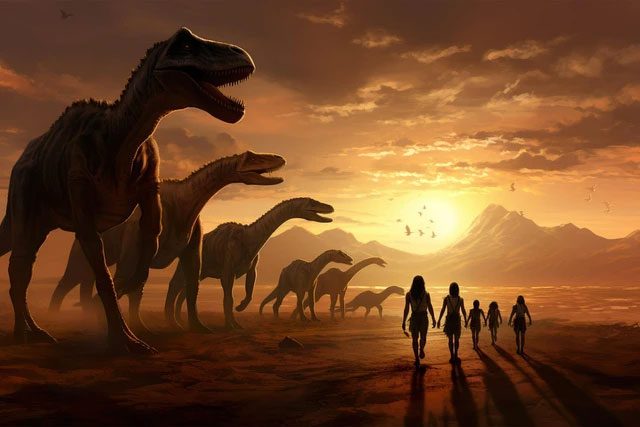Humans could have lived up to 200 years if not for an event causing a “lifespan bottleneck” that affected ancestral species.
A new study led by Dr. João Pedro de Magalhães from the University of Birmingham (UK) reveals that humans and many other ancestral species have been deprived of certain “longevity genes.”
According to Science Alert, this occurred in the lineage of Eutherian mammals, one of the two branches of mammals that diverged at the beginning of the Cretaceous period or the end of the Jurassic period.

Dinosaurs did not coexist, but they directly influenced human lifespan by overshadowing the habitats of ancestral species – (Graphic Image: SCITECH DAILY).
Eutheria is the ancestor of humans and countless other animals that exist today. Growing up in the “age of monsters” posed significant disadvantages for this lineage.
“Some of the first mammals had to live at the bottom of the food chain and may have spent 100 million years during the evolutionary age of dinosaurs surviving through rapid reproduction,” Dr. de Magalhães stated.
However, they were forced to eliminate some valuable “innate” genetic factors.
These eliminated factors included enzymes that help repair damage caused by ultraviolet rays. This also occurred with marsupials, which are descendants of another mammalian branch that coexisted with Eutheria.
This may be because they had to live more nocturnally for safety. As a result, humans today must rely on sunscreen to prevent a range of issues, including skin cancer.
Additionally, the genes that allow for multiple sets of teeth, possessed by many reptiles, have also been lost in mammals. Thus, we are left battling with deteriorating teeth in middle age, which may be completely lost in old age.
Overall, many genes related to greater longevity, resistance to certain diseases, and maintenance of health in old age have been eliminated due to survival priorities.
These disadvantages led to a significant advantage in the wild Cretaceous period: mammals with “streamlined” genes could grow quickly and reproduce more.
As a result, they could use their dense “population” to compensate for being hunted and overshadowed by larger animals, surviving 100 million years alongside dinosaurs.
Small but agile, mammals survived the age of monsters, even outlasting the “mass extinction of dinosaurs” 66 million years ago, despite their short lives.
This study also helps to further understand the factors behind aging, paving the way for a range of research aimed at combating age-related diseases, including dementia, strokes, and higher cancer risks than other species…
The results have just been published in the scientific journal BioEssays.



















































